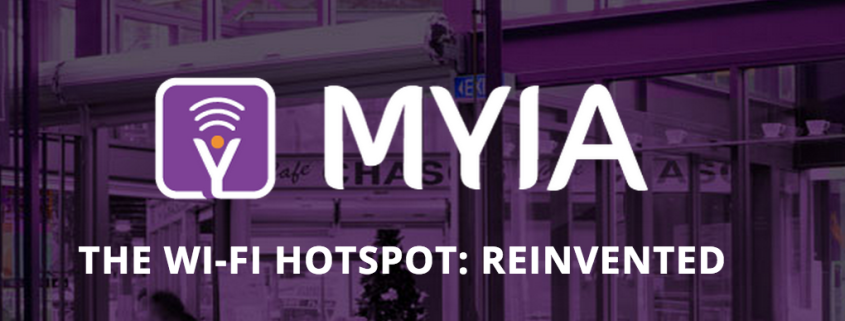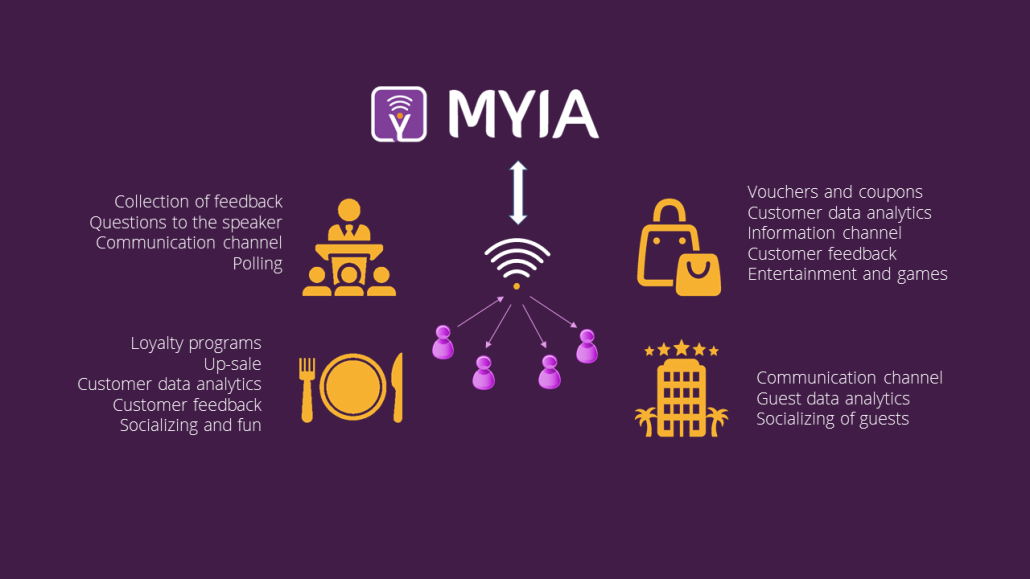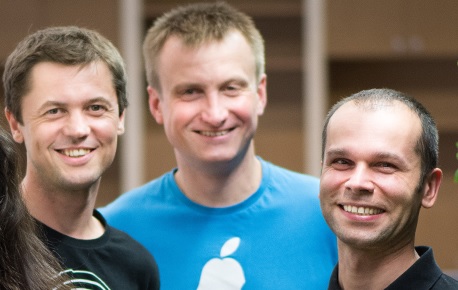Introducing the StartupYard 2015 Startups: Myia: Making Wifi Accessible Everywhere
The Myia team joined StartupYard with not much more than a great idea, and the will to make it happen. Since they’ve been at the accelerator, it’s been a pleasure to see that idea grow into something truly unique and interesting.
Originally designed as a hyper-local messaging app, Myia has evolved into a concept with truly global potential.
It will be a platform that brings Wi-Fi as a common utility to a completely new level. Users around the world, at conferences, hotels, or other public spaces like shopping centers, will be able to access locally relevant services, information and communication channels, seamlessly and instantly with Myia.
Myia will also help Wi-Fi providers offer new services to their customers and visitors.
This is an idea who’s time has truly come, and Myia wants to be the company that finally delivers on the promise of easily accessible Wi-Fi, anywhere you go.
I’ll let Ondrej Cervinka, CEO of Myia, tell you more:
Hi Ondrej, First off, I’m sure people are curious about your company’s name. What’s the backstory there?
Oh, it’s a long story but I enjoy telling it. Originally, the name was Xin, which is a Chinese word with many different meanings depending on the pronunciation – sign, letter, heart, mind, feeling, soul, intelligence, new, fresh, true, real.
It was perfect name for the messenger functions we had at that time. We built Myia originally as a Wifi based local messaging app. However, we received some negative feedback from American users about the name- it was hard to say, and seemed too foreign for some. So we were looking for another name.
One day we were discussing the name with a great StartupYard mentor, Liva Judic, and we thought: “Wait a minute, Liva is actually a nice name”. Unfortunately, Liva has been registered as a trademark so we couldn’t use it.
But we already liked the idea of having a feminine name, so we ended up with Myia. I like the name very much. Myia was a Greek philosopher and one of the daughters of Pythagoras. I like math, numbers and philosophy. So it is kind of attractive to me. Actually, it is pronounced as “mee ya”.
Unlike most of the other startups in StartupYard 2015, Myia came into the program with something very different from the new core product. What motivated you to join the accelerator?
A: At the beginning of 2015 we had a mobile app in all 3 app stores. It was simply a messenger that allowed users to send messages to anybody connected to the same Wi-Fi.
It was actually an outcome of a Microsoft Windows Phone hackathon organized at the Prague Impact Hub, where our company, WujiGrid, has offices. We had promising user responses and a lot of ideas for other features to add and how to improve the technology.
At that time StartupYard had just opened applications for its 5th batch of startups. We immediately jumped on the opportunity. Our goal was to use the mentors provided by the StartupYard program.
We wanted to consult with them on our business ideas and build a viable business model for Myia. We were also prepared to hear that there was no real business in Myia, and that we should keep it just as a toy app and do something else.
So the reason to join the accelerator was to get help with the areas where we did not feel very strong – business modeling, sales, and marketing. After one month in StartupYard we can say it was definitely a good decision.
How has your vision for Myia evolved over the past few months?
Our first goal was to narrow the possibilities for Myia down to one or just a few. It’s funny, but each day with mentors brought new ideas, new areas where Myia can be useful and new use cases. So at the beginning, the options didn’t get narrower, but wider.
We evolved the vision of Myia into an app that has two faces: First, people who install the app on their smartphones and second, providers of Wi-Fi, the owners of the hotspots. These two groups depend on each other.
For consumers, Myia is an app that provides a valuable functions and features depending on the type of place – restaurant, bar, café, concert, hotel, shopping mall, conference, airport, etc. Wi-Fi is ubiquitous technology today.
With Myia, you can meet new people, find a pool player in a pub, learn what is hot and cool in this place, get discount coupon or a voucher, rate presenters, vote for the best gig on the stage, contact hotel front desk, you name it. It is useful, it is fun, and it is relevant to the place where you are now.
Myia is also for the businesses who offer free Wi-Fi for their customers and who are looking for ways how to provide more added-value to them. It provides them a unique communication channel to their customers.
They can learn opinions of their guests and collect feedback. They can announce new shops in a mall, happy hours in a bar, send special offers. It is easy to postpone start of the first presentation after lunch on a conference, collect questions and rate the presentation. We can build loyalty programs for different businesses.
What has been the biggest challenge in adjusting your early vision to incorporate so much feedback from the StartupYard mentors?
A: As I said, we got a lot of feedback, ideas, opinions and advice from the mentors. Quite often they were even contradictory, which is great because we got wholly different perspectives.
We see it from many different angles now. So many different ideas are of course difficult to sort out. We cannot do everything together but we do not want to spend next 6 month on something that just to find out it’s a dead end.
Certain use cases work well only after there is certain percentage of people who use Myia. Of course, they will use it only if it brings them some value. So there is a classic chicken-or-egg problem here. After somebody installs the app they want to find many places where they can use it. So you have to start with something where people go often.
At the same time, Myia must bring a compelling value proposition both to the owner as well as to the end user. And we try to make it as viral as possible.
We are still working on this – trying to come out with different value propositions for various areas, test them with businesses, evaluate, and find overlaps with other areas. I see it as an organism. If everything fits together it starts to grow.
Tell us a bit about your background, and that of your team.
A: I am a programmer by profession. I studied artificial intelligence at CTU and then worked on various AI projects in Rockwell research center here in Prague. Then I joined a Swiss software house named IPS in 2000.
I met my Myia cofounders Filip and Michael there. Actually, Michael was one of my computer science students when I did my PhD, and Filip was the first candidate that I interviewed in my life.
At the end I was director of the IPS Prague branch and Filip was software architect in IPS. Then in 2010 we decided to found a startup called WujiGrid. It is a real-time collaboration app. It is kind of a shared desktop but it is in the cloud and it belongs to everyone in the collaboration group. And now we are with Myia.
So we have worked together for 15 years! All three of us are software engineers, so we might be weaker in sales and marketing. But very strong point is mutual trust. It is great if you know we can rely on each other in difficult times.
Q: Who will be your earliest clients? How will Myia make its first dollar on the market?
A: We’re working with businesses to pilot the service in different areas. StartupYard has helped us with their contacts and we are also doing very interesting things with Impact Hub Prague, which is our home turf.
We participate in Hub events and do networking games where Myia helps you to meet people that you are looking for. We really appreciate this cooperation.
Our plan is that the service will be free for the early adopters. This way we can spread the service as fast as possible because the more people use Myia the more useful it is for everyone. It will also help us to define exactly what value our users see in the service.
I think we will make the first dollar on some customization or implementation of specific functionalities for a large business. On top of that, we hope that the module for events will be the first paid service.
Q: Where do you see Myia as a business in 2-3 years? What do you see as some promising use cases and unexplored markets for the technology?
A: Ok, it’s going to be interesting to read this answer in 2-3 years from now, right? Long term, even with WujiGrid, we are interested in interaction between people, communication, collaboration, combining their skills and talents. We see Myia as a communication accelerator.
It puts together people who are at the same place at the same time. They meet with the help of Myia but then they interact in a real, natural way. Today everybody talks about social networks. Myia creates a network that is tightly linked to the real physical world.
Every day we meet a lot of people we do not know by name. Sometimes we meet them regularly, like on a bus when you go to work in the morning.
Imagine you lost your wallet in a foreign city where you are on a business trip. What do you do? Now Myia can tell you “Hey, there is a guy who takes the same bus as you every morning in your hotel, do you want to ping him?” He might help you, right?
Or your flight is delayed by 3 hours, you sit in the airport having nothing to do but wait and Myia beeps: “There is somebody waiting in the next gate who visited the same concert of Groove Planet you just attended last night.” Suddenly, you have a beer with them and enjoy the time.
Or business-wise, an airport shop can suggest there is new Groove Planet CD available. Ok, there will be no CD shops in 2-3 years, but this is the idea. From the technology point of view big data, machine learning, mathematical modelling, etc. this will be our way forward.
Q: This is a crowded market- some players in public Wi-Fi access include T-Mobile and Skype, as well as Google. What makes Myia special in your view?
This is difficult question. Myia relies on existing Wi-Fi infrastructure, so we see T-Mobile as a partner, the same is with Skype Wi-Fi. If a business place provides a Wi-Fi hotspot with any of the existing providers, Myia is able to bring some new monetization opportunities for the business owner.
Google relies on advertising, which is not what we plan to do. But I do not want to rule out your question based on just these examples. There may be some players in the market already, but this does not mean there is no space for more innovative players.
In fact, I think the fact that there remains no single preferred solution for wifi shows that the market is not fully mature yet- and there are a lot of opportunities to find new efficiencies.
The demand for public WiFi continues to grow, and as it does, the opportunities to add value in that market also multiply- we don’t see “competition” in that sense to be a bad thing at all. The more players in the market, the more customers will be aware of new possibilities, and have an opportunity to choose Myia for the value it adds.







